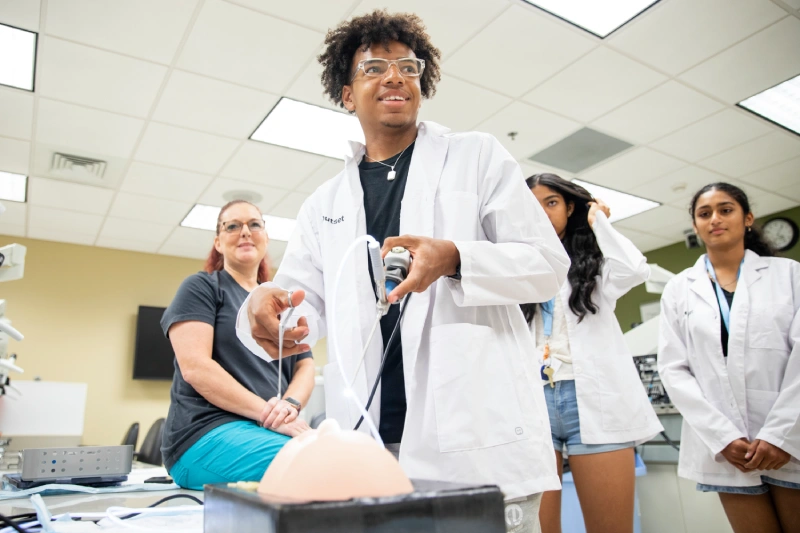Healthcare isn't confined to doctors and nurses anymore. For high school students exploring various types of healthcare careers, there's a path for nearly every interest and skill set. Whether you're drawn to direct patient care or roles behind the scenes like health information technicians, there's a place for you in this diverse field. Each role requires different education levels and certifications, but all keep our healthcare systems running.
Thanks to technological advances, new avenues like telemedicine are expanding access and breaking down barriers to care. By diving into relevant coursework, volunteer opportunities, and extracurricular activities, students can discover which types of healthcare careers truly resonate with them.
Clinical Types of Healthcare Careers
Clinical healthcare careers are the heartbeat of patient care. Each role demands specialized education and offers unique growth opportunities, whether you're interacting directly with patients or focusing on research and management. Let's take a closer look at some key options.
Doctor (MD/DO)
Becoming a Doctor of Medicine (MD) is a rigorous journey. It typically involves earning a bachelor's degree, followed by four years of medical school, and then 3-7 years in a residency program specializing in a chosen field. Doctors diagnose illnesses, perform procedures, and manage patient care.
Many specialize in areas like cardiology or emergency medicine, making advances that benefit entire communities.
Median salary for physicians: $239,200 or more per year, according to the U.S. Bureau of Labor Statistics.
Nurse (RN, NP)
Nurses are the vital link between patients and the broader medical team. Registered Nurses (RNs) usually hold an Associate Degree in Nursing (ADN) or a Bachelor of Science in Nursing (BSN) and must pass the NCLEX-RN for licensure.
Nurse Practitioners (NPs) earn a master's or doctoral degree, enabling them to diagnose illnesses, prescribe medication, and handle many tasks traditionally associated with physicians. Whether in pediatrics, oncology, or geriatrics, nurses make a significant difference in patient outcomes.
Median salary for nurse practitioners: $129,480 per year, according to the U.S. Bureau of Labor Statistics.
Physician Assistant (PA)
Physician Assistants conduct exams, diagnose conditions, and develop treatment plans under a physician's guidance.
PA programs require a master's degree from an accredited institution, followed by the National Commission on Certification of Physician Assistants (NCCPA) exam. Specializing in areas like surgery or emergency medicine, PAs enhance patient access to quality care.
Median salary for physician assistants: $130,020 per year, according to the U.S. Bureau of Labor Statistics.
Pharmacist
Pharmacists focus on medication management and patient counseling. They complete a Doctor of Pharmacy (PharmD) degree and pass licensure exams.
In clinical settings, pharmacists work closely with doctors to optimize drug therapies and provide education. Specializations range from hospital pharmacy to oncology, each playing a key role in patient safety and recovery.
Median salary for pharmacists: $136,030 per year, according to the U.S. Bureau of Labor Statistics.
Physical Therapist (PT)
Physical therapists help people regain mobility and manage pain after surgery, injury, or illness. Earning a Doctor of Physical Therapy (DPT) and obtaining state licensure are prerequisites. PTs design exercises and therapy plans to promote recovery and improve quality of life. Specializations in fields like sports medicine, neurology, and orthopedics offer additional career opportunities.
Median salary for physical therapists: $99,710 per year, according to the U.S. Bureau of Labor Statistics.
Occupational Therapist (OT)
Occupational therapists assist individuals in rebuilding the skills needed for everyday living. They earn a master’s or doctoral degree in occupational therapy plus licensure. Whether working with children, older adults, or those with specific injuries, OTs create personalized treatment strategies that support independent living.
Median salary for occupational therapists: $96,370 per year, according to the U.S. Bureau of Labor Statistics.
Dentist
Dentists protect oral health through cleanings, exams, and procedures. They complete a Doctor of Dental Surgery (DDS) or Doctor of Dental Medicine (DMD) program and pass state licensure requirements. Specialties like orthodontics, periodontics, and oral surgery play essential roles in comprehensive dental care.
Median salary for dentists: $170,910 per year, according to the U.S. Bureau of Labor Statistics.
These professions anchor patient-centered care and push medical progress forward. Specializing in any of these types of healthcare careers allows you to tailor your expertise, meet evolving healthcare needs, and improve outcomes for individuals and communities alike.
Non-Clinical Healthcare Careers
Non-clinical healthcare careers play an indispensable role in the delivery and management of health services. While they don't involve direct patient care, they support the broader system, streamline operations, and drive new knowledge. Here are a few paths worth considering.
Healthcare Administrator
Healthcare administrators, or health services managers, oversee day-to-day facility operations. Responsibilities include:
- Managing budgets and ensuring financial health
- Overseeing staff recruitment, training, and retention
- Ensuring regulatory compliance
- Developing policies that enhance service quality
Many enter the field with degrees in healthcare administration or management.
Medical Researcher
Medical researchers design studies to understand diseases and develop treatments. They often hold a master's or Ph.D. in a related scientific field. Daily tasks involve collaborating with other researchers, analyzing data, and publishing findings to propel medical breakthroughs.
Public Health Specialist
Public health specialists tackle community health challenges. They create prevention programs, investigate outbreaks, and shape policy. Often found in government agencies or international organizations, they can advance to roles in epidemiology or leadership.
Medical Illustrator
Medical illustrators combine artistic talent with medical knowledge. Their visuals clarify complex health information in textbooks, research papers, and patient education materials. Formal training in art and science is typically required.
Health Information Manager
Health information managers maintain the accuracy, security, and flow of electronic health records (EHR). They implement EHR systems, monitor staff compliance, and ensure patient confidentiality. With experience, they can move into senior roles like Chief Information Officer.
Emerging Careers in Healthcare
Telemedicine Specialist
Telemedicine specialists oversee remote healthcare services and compliance. This role blends expertise in information technology with an understanding of clinical workflows, allowing patients to connect with providers outside a traditional office setting.
Health Tech and AI in Medicine
Professionals at the intersection of health technology and AI develop software that enhances diagnostics, patient care, and operational efficiency. A background in data science or engineering is common, with roles available at hospitals, startups, and research labs.
Genetic Counselor
Genetic counselors assess patients' risks for inherited conditions. After completing a specialized master's program, they guide individuals and families through complex genetic information, sometimes branching into research or genetics education.
Non-clinical paths offer meaningful ways to support healthcare outcomes. By ensuring facilities run smoothly, advancing scientific knowledge, and keeping operations secure, these types of healthcare careers form a strong foundation for patient care.
Tips to Choose the Best Type of Healthcare Career for You
Figuring out which healthcare path aligns with your interests, strengths, and values can be a revealing journey. Here are some tips to help you choose the best type of healthcare career for you:
- Discover what sparks your curiosity: Start by identifying which aspects of healthcare most excite you. Do you enjoy one-on-one patient interaction, or are you more drawn to data analysis and research? Exploring these questions can point you in the right direction.
- Assess your strengths: Tools like Gallup's CliftonStrengths can highlight areas where you naturally excel. Knowing your strengths can help match you with a career where you'll thrive.
- Gain real-world exposure: Informational interviews or shadowing sessions provide a vivid picture of a typical day in various healthcare careers.
- Connect with mentors: Whether through volunteer opportunities or structured programs, connecting with seasoned professionals builds confidence and clarity and can help you navigate uncertainties around the healthcare field.
- Blend self-reflection with hands-on experience: Combining introspection with practical exposure lays a strong foundation for choosing the healthcare career that's right for you.
How Outset can help you discover your career
Outset's summer programs provide a valuable opportunity for high school students in grades 9 through 12 to experience different types of healthcare careers up close. These week-long camps take place on college campuses, giving participants a taste of campus life while they gain practical skills from medical professionals. Hands-on workshops deliver lessons that go beyond classroom theory, sparking a deeper understanding of career possibilities.
The curriculum demystifies the pre-med track through direct conversations with doctors and medical students who share real-world experiences. Many participants find that this exposure builds confidence, easing the uncertainties of choosing a healthcare path. By seeing medical concepts come to life, students can make more informed decisions about whether a clinical or non-clinical role fits their goals.
Final Thoughts
Embarking on a healthcare career can be both professionally and personally rewarding. These roles build skills like flexibility, collaboration, and leadership, preparing you for success wherever you go.
Exploring volunteer opportunities, campus programs, and mentorship connections can help refine your direction. Real-world exposure often ignites your motivation and clarifies the path that suits your strengths. Choosing from the various types of healthcare careers means stepping into a field defined by compassion and discovery—ready to serve patients, communities, and your own aspirations.














.png)








